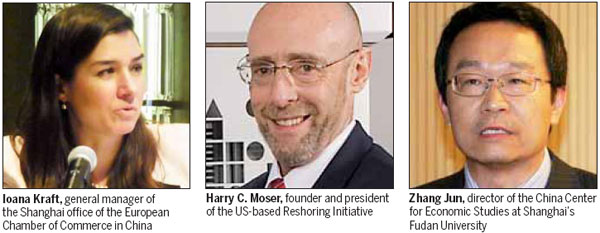US, EU firms discover home truths
Updated: 2014-01-03 10:00
By Matt Hodges (China Daily Europe)
|
|||||||||||

Lower margins
According to a report published by the Reshoring Initiative in July, higher wages has been the main reason for most of the reshoring activities by US companies. By the same token, the ECCC's Business Confidence Survey 2013 reports that 63 percent of European companies it polled rank this as the most significant challenge they will face in their future business in China.
"Tougher business conditions, both globally and in China, have led to a diminished financial performance for European companies in China in recent years," the report said. "Profitability is on a clear downward slide and high margins may be increasingly a thing of the past."
Despite this, 86 percent of respondents said they were considering expanding their operations in China, with 41 percent now considering M&As. Moreover, while some 22 percent of European companies were thinking of moving their current or planned investments in China to a different country in 2012, the number has since fallen to 10 percent.
As the logic of "going local to stay local" increasingly rings true, 75 percent of respondents to the survey said their primary reason for being in China was to serve the domestic market, up from 72 percent in 2012.
Other reasons for leaving cited by American companies were the unfavorable exchange rate, quality issues, freight costs, delivery problems and deadlines not being met, as outlined by the Reshoring Initiative's report.
Among the examples it gave were Sleek Audio LLC, which took manufacturing jobs back to Florida after losing hundreds of thousands of dollars in scrap - and more in lost sales - due to poor quality control in China. Scovill Fasteners Inc cited rising salaries and the fact that a quarter of its staff failed to return from their annual holidays in explaining its decision to go back to Georgia.
Other drivers compelling companies to jump ship include high oil prices, which make international shipping more costly, and friendlier investment climates in the US and parts of Europe.
"Current research shows many (US) companies can reshore about 25 percent of what they have offshored and improve their profitability," says Moser.
He provided statistics showing that the number of manufacturing jobs offshored from the US grew by 100,000 to 150,000 annually from 2000 to 2008, compared with about 2,000 a year that reshored.
That equation has since changed dramatically to between 30,000 and 50,000 jobs a year being offshored versus 30,000 a year that are reshoring, he said. If true, this illustrates how the mass exodus out of the West five years ago has been replaced by a growing sense of equilibrium.
"New offshoring is down 70 percent to 80 percent, and new reshoring is up about 1,500 percent," he says.
However, while high-profile companies such as Caterpillar Inc, Google Inc and Ford Motor Co have followed the reshoring trend, finance professors and business consultancies in Shanghai warn against overplaying the situation.
"Salaries for technicians and designers in China are still much lower than in the US and Europe," says Zhang Jun, director of the China Center for Economic Studies at Shanghai's Fudan University.
"The trend's fate over the longer term really depends on how well and how quickly China can transform itself from a country driven by investment and imports to one driven by domestic consumption," CEIBS' Xu says.
Lower incentives
China, meanwhile, is slowly reducing incentives to attract foreign direct investment. Changes in the value of the yuan, dollar and other currencies are having an impact as well.
"In the past, the Chinese government used many favorable policies to attract FDI, but as Chinese companies close the technological gap, it is winding these down," says Xu.
"This is going to continue, and foreign multinationals find it quite frustrating. They're also not receiving the kind of policy incentives that local companies are getting."
Small companies are also getting in on the act.
In April, Jason Speer, the president of Quality Float Works Inc, a Chicago company that makes hollow float metal balls, told ABC Radio Australia that his experiment with outsourcing to China had failed due to faulty materials and delivery delays.
"It started out being a very positive experience. We were able to save a lot of money, but unfortunately it went downhill," Speer says. "It became a nightmare. It ended up costing us money overall, because all the time and money that we wasted in trying to check everything ... we ended up just having to buy it again."
Boston Consulting Group advises companies to "rigorously assess their global supply networks" when deciding where to base production, rather than just looking at factory prices.
It said that China remains the best choice for products that require a large workforce or that are destined for Asian markets. But it added that companies that choose to keep production in China need dramatic efficiency improvement to prosper.
One German businessman whose company makes automobile components in North China said that it's the country's winning supply chain that keeps his company anchored. But he expects more foreign companies will leave in the next five years as tax and land incentives weaken.
matthewhodges@chinadaily.com.cn
( China Daily European Weekly 01/03/2014 page14)
Today's Top News
Iran nuclear deal to take effect on Jan 20
Obama welcomes agreement on Iran nuclear deal
Unexpected sharp fall in tourism hits Beijing
Japan tries to justify Abe's shrine visit
Ground control to Major Tang
Int'l air carriers seeks China share
Apology letter showed goodwill toward China
Sharon's death triggers mixed reactions
Hot Topics
Lunar probe , China growth forecasts, Emission rules get tougher, China seen through 'colored lens', International board,
Editor's Picks

|

|

|

|

|

|





